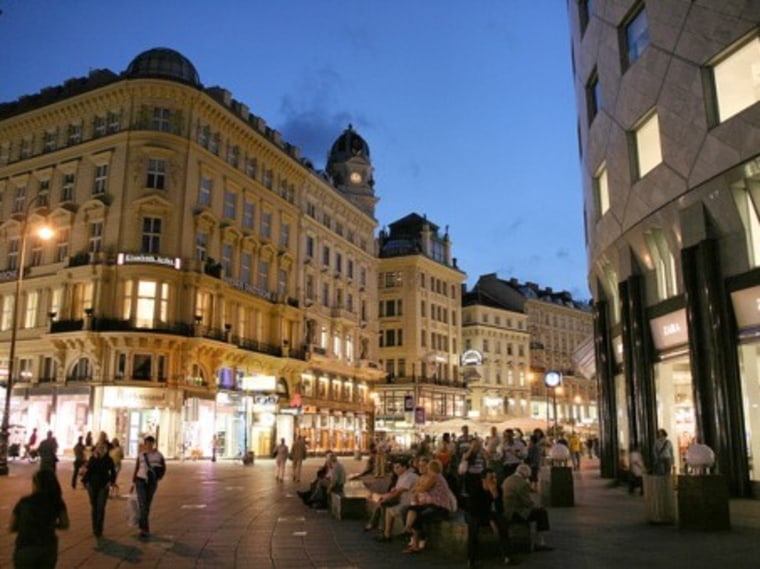Over the past three centuries Vienna has produced the visionary composers Joseph Haydn, Franz Schubert and Johann Strauss. This year the culturally and historically vibrant Austrian capital can claim another feat: For the second year it has been named the world's best place to live, according to a report released last week.
Vienna offers a thriving opera scene, a hospitable business environment and a comprehensive public transportation system. Zurich and Geneva take the No. 2 and 3 spots, respectively. Switzerland's strong showing on the list is little surprise to Mercer, the global outsourcing and investment consultancy that produces the annual Worldwide Quality of Living Survey.
“The Swiss cities are very pleasant, the natural environment is clean, and we weigh heavily the prevalence of hostilities, and Switzerland is neutral,” says Rebecca Powers, a Mercer consultant. “If you can't be safe in Switzerland, you can't be safe anywhere.”
Vienna beat Zurich by just over half an index point, and less than one point separates the top three cities, making them roughly equal for livability.
“There's probably a little bit more to do in Austria than Switzerland — I would think the symphony is better — but we're splitting hairs between countries,” says Powers.
European cities take seven of the top 10 spots for quality of life, thanks to their relative safety, political stability and cultural offerings. As for the U.S., Honolulu, at No. 31, has the best quality-of-life record and the continental U.S. makes its first appearance on the list at 32, with San Francisco tying Adelaide, Australia. Boston came in at No. 37, Chicago and Washington, D.C. tied for 45th place, and New York ranked 49. Philadelphia and Dallas were ranked for the first time this year, landing spots 55 and 61 on the list, respectively.
Mercer ranked 221 global cities on 39 measures, emphasizing political safety and health, but also including factors from restaurant availability to air pollution. Cities are ranked against New York as the base city; it has an index score of 100.
The cities that scored best on Mercer's list had the best safety records and the lowest levels of political upheaval, which helps explain why volatile Baghdad sunk to the last-place spot. While strong infrastructure, cultural amenities and good schools also helped separate the top and bottom cities, most of that was trumped by the importance of local stability.
Although the U.S. didn't do poorly by Mercer's standards — most American cities on the list had index scores above 100 — weaker safety records kept them from competing with lower-crime Western European capitals.
“In the U.S., crime is typically more prevalent, and the availability of handguns is an issue,” says Powers. “Many of the locations in Canada and Switzerland have a little more of social net that diminishes that kind of crime.”
As it was last year, Singapore is Asia's highest-ranking city at No. 28. Tokyo ranked 40, Japanese cities Kobe and Yokohama were tied for 41, and Osaka and Nagoya ranked 51 and 57, respectively. These cities had index scores between 123 and 132.
Some Asian cities held spots near the bottom of the list, as well: Dhaka, Bangladesh; Bishkek, Kyrgyzstan and Dushanbe, Tajikistan, took spots 206, 209 and 210 respectively. Political unrest combined with environmental dangers threatened the quality of life in these cities.
“Increasing threats of violence and terrorism, coupled with natural disasters such as earthquakes, typhoons and cyclones have had a negative impact on the quality of living in Asian cities,” says Mercer senior researcher Slagin Parakatil in the report. “This may result in higher hardship allowances for expatriates sent to these countries.”
This year Mercer introduced its eco city rankings, published alongside its quality-of-living list, which scores countries on how well they promote sustainability and protect their environments. Calgary, Canada took the top spot and American cities Honolulu and Minneapolis scored in the top 10 on this measure, which factored in the quality of water and air quality, sewage removal and traffic congestion.
While the correlation isn't scientific, many of the cities that ranked highly for quality of life also scored well for ecological responsibility.
“It could be because everything else is running so well, they can afford to think about the environment,” says Powers.
International companies watch the Mercer study closely to help determine not just where to set up shop, but how much they should compensate relocating employees whose quality of life may be diminished by a move. For that reason the report ranks many cities in developing countries, where business is increasingly being done but the nuances of lifestyle may remain a mystery.
